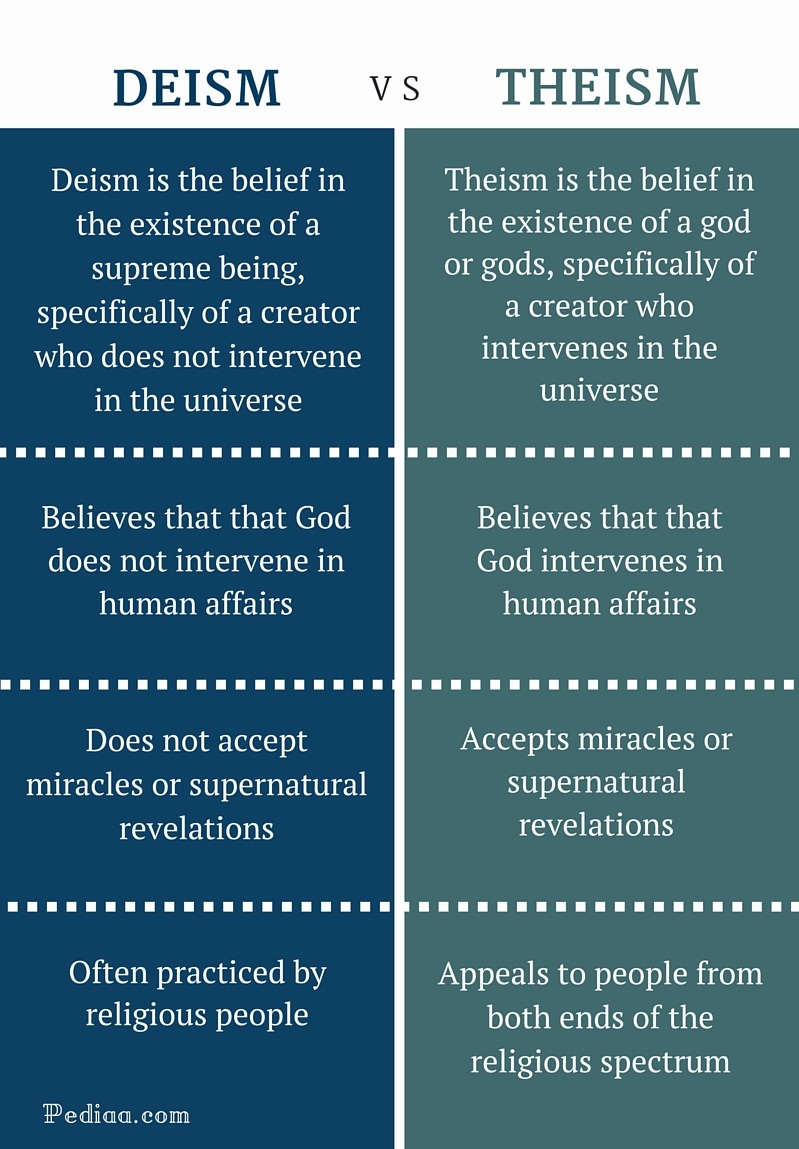Meaning of deism in English. Noun U religion uk /ˈdeɪ.ɪ.z əm/ us /ˈdeɪ.ɪ.z əm/. › the belief in a single god who does not act to influence events, and whose existence has no connection with religions, religious buildings, or religious books, etc.
English[edit]
English Wikipedia has an article on:
Wikipedia Alternative forms[edit]
Etymology[edit]
From Frenchdéisme, from Latindeus(“god, deity”) + -ism.
Pronunciation[edit]
- (Received Pronunciation,General American)IPA(key): /ˈdiːɪz(ə)m/, /ˈdeɪ-/
Audio (RP) - Hyphenation: de‧i‧sm
Noun[edit]
deism (usually uncountable, pluraldeisms)
- A philosophical belief in the existence of a god (or goddess) knowable through human reason; especially, a belief in a creator god unaccompanied by any belief in supernatural phenomena or specific religious doctrines.
- 1682, John Dryden, Religio Laici, Or A Layman's Faith:
- If my supposition be true, then the consequence which I have assumed in my Poem may be also true; namely, that Deism, or the principles of natural worship, are only the faint remnants or dying flames of reveal'd religion in the posterity of Noah.
- 1847, Julius Charles Hare & Augustus William Hare, Guesses at Truth, p.39:
- As the Epicureans had a Deism without a God, so the Unitarians have a Christianity without a Christ, and a Jesus but no Saviour.
- 2009, Diarmaid MacCulloch, A History of Christianity, Penguin 2010, page 786:
- In place of the idea which runs through the Tanakh and New Testament of a God intimately involved with his creation and providentially repeatedly intervening in it, there was the concept of a God who had certainly created the world and set up its laws in structures understandable by human reason, but who after that allowed it to go its own way, precisely because reason was one of his chief gifts to humanity, and order a gift to his creation. This was the approach to divinity known as deism.
- 1682, John Dryden, Religio Laici, Or A Layman's Faith:
- Belief in a god who ceased to intervene with existence after acting as the cause of the cosmos.
Usage notes[edit]
The word is often capitalized when referring to the rise of such beliefs in 17th and 18th century Europe and America.
Quotations[edit]
- For quotations of use of this term, see Citations:deism.
Coordinate terms[edit]
- (religions) religion; Ahmadiyya, Asatru, Bahá'í Faith, Buddhism, Cao Dai, Cheondoism, Christianity, deism, Druidry, Eckankar, Flying Spaghetti Monsterism, Heathenry, Hinduism, Islam, Jainism, Jediism, Judaism, Kimbanguism, Odinism, paganism, Pastafarianism, Raëlism, Rastafarianism, Shinto, Sikhism, Taoism, Thelema, Unitarian Universalism, Wicca, Yazidism, Yoruba, Zoroastrianism(Category: en:Religion)[edit]
Derived terms[edit]
Translations[edit]
|
|
- The translations below need to be checked and inserted above into the appropriate translation tables, removing any numbers. Numbers do not necessarily match those in definitions. See instructions at Wiktionary:Entry layout#Translations.
|
|
See also[edit]
Anagrams[edit]
- Diems, demis, dimes, disme
Estonian[edit]
Estonian Wikipedia has an article on:
Wikipedia etEtymology[edit]
(This etymology is missing or incomplete. Please add to it, or discuss it at the Etymology scriptorium.)
Noun[edit]
deism (genitive[please provide], partitive[please provide])
Inflection[edit]
This noun needs an inflection-table template.
Romanian[edit]
Romanian Wikipedia has an article on:
Wikipedia roEtymology[edit]
Borrowed from Frenchdéisme.
Noun[edit]
deismn (uncountable)
Declension[edit]
| singular | ||
|---|---|---|
| n gender | indefinite articulation | definite articulation |
| nominative/accusative | (un) deism | deismul |
| genitive/dative | (unui) deism | deismului |
| vocative | deismule | |
Swedish[edit]
Swedish Wikipedia has an article on:
Wikipedia sv
Noun[edit]
deismc
Declension[edit]
| Declension of deism | ||||
|---|---|---|---|---|
| Singular | Plural | |||
| Indefinite | Definite | Indefinite | Definite | |
| Nominative | deism | deismen | deismer | deismerna |
| Genitive | deisms | deismens | deismers | deismernas |
Anagrams[edit]
Retrieved from 'https://en.wiktionary.org/w/index.php?title=deism&oldid=59157722'
